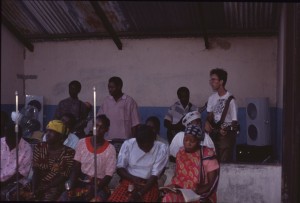When I was working as a VSO in Dodoma in the early nineties, I joined a local band playing dance and taarab music. The band was made up of about 20 musicians (varying a bit from day to day) with two guitars, a bass, keyboard, an occasional accordion and saxophone and lots of drummers. There were usually about three or four singers singing together in tight harmony. The dance songs all started off slowly (rumba) then livened up (kwasa-kwasa/mayeno) and a song could last over 10 minutes, with lots of improvised solos. It was only after a few months of playing with them that I realised that all the instruments belonged to a local tajiri (rich man) and that none of these excellent musicians could afford to buy their own instruments.
Apart from the few who played music in their spare time, the band members had a very hard life. On one occasion I remember they were on tour and eventually ran out of money in Dumila (near Morogoro) not having enough money for food let alone the fare to Dodoma. They were about to start selling off the instruments, but luckily the manager of a local guesti (guest house) let them play for their food and after a few nights with good audiences they able to return – all noticeably thinner. The band made some recordings, and we played on Radio Tanzania, but not much of this trickled through to the band members whose main income was playing at weddings and political functions, and getting tips from guests.
I am glad to say that on recent visits I have found the situation improving. It seems that Tanzanian music has finally broken the domination of Zaire/Democratic Republic of the Congo and suddenly everyone is listening to Swahili bands. In the early nineties there were hardly any Tanzanian bands on the radio (I can remember only about 3 or 4 songs by Magereza Jazz & Mlimani Park Orchestra) and their recordings were usually pretty awful quality. Now following from Diamond Sound, which was a mixed Tanzanian/Congolese band, there are a group of bands like Tam Tam (African Revolution), Twanga Pepeta (African Stars) and Chuchu Sound who all attract large audiences. These days it seems like about 75% of dance music on the radio and in the discos is by Tanzanian bands. I was also glad to find out that several of the musicians I had known in Dodoma are now doing well in the Dar-es-Salaam bands.
In September I met Muumini Mwinjuma (‘Coach wa Dunia’) who is the band leader of Tam Tam at the Lion Hotel in Sinza, and I asked him what he thought was the reason for the changes. He mentioned that several of the band members had been playing in Nairobi but had returned to Dar seeing the economic prospects reviving. There are more restrictions on pirating cassettes -‘original’ cassettes are much more widely available and the bands (or anyway band owners) see more of the proceeds. Also the quality of the recordings has vastly improved – there is a studio in Dar and CD’s are available (though at TShs 12,000 (£10) a time they are not yet widespread). A big reason for the popularity is having songs in Swahili with meaningful lyrics that people can enjoy. The latest album from Tam Tam (Maisha Kitendawili – Life is a riddle) deals with difficult issues like Aids (‘Ndani kwetu limeingia Nyambizi – tujihadhari kuna hatari’ – A monster has come among us – we should be on our guard, there is danger) as well as love songs. It seems that Tanzanians have finally developed their own style.
If you want to experience it yourself I would recommend you try the Tam Tam CD! These are available from Mr M Baraka who is the band owner of both Twanga Pepeta and Tam Tam at twangapepetas@hotmail.com. For other African music try ‘Stern’s Music’, 293 Euston Road, near Warren Street station in London, or www.sternsmusic.com
Jacob Knight

